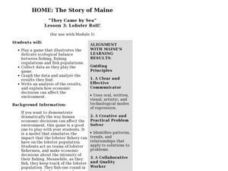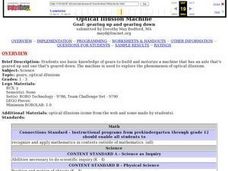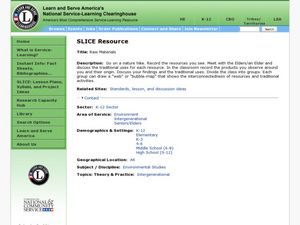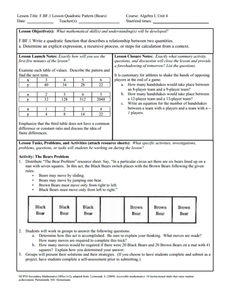Curated OER
The Atrazine Dilemma
Students understand how farming practices and the topography of a region can effect the health and safety of all living things. Students play a game which helps them understand how the chemical Azatrine has spread in the watershed.
Curated OER
Lesson 3: Lobster Roll!
Students play a game that illustrates the delicate ecological balance between fishing, fishing regulations and fish populations. They collect data and analyze the results.
Curated OER
Optical Illusion Machine
Students explore optical illusions. Using Legos, they construct and motorize a machine that has an axle that's geared up and geared down, complete a worksheet, and answer discussion questions.
Curated OER
Raw Materials
Students participate in a nature hike and record the natural resources observed. They compare traditional and modern versions of everyday use items, and create graphic organizers that demonstrate the interconnectedness of resources.
Curated OER
Geography, Energy, and the Twenty-First Century
Students examine the past and present effects of energy sources on geography in the 21st century. They compare/contrast energy consumption and production in the U.S. and the world, make predictions for future energy consumption, and...
Curated OER
Bears
Students complete a variety of bear-related activities. They sort and graph teddy bears, distinguish between real and non-real bears and research bear life cycles and habitats.
Curated OER
Lesson 3: Making a Living
Students, in groups, create hypothetical financial plans for a colonial Maine family living on the frontier.
Curated OER
Twisted Vision
Students explain polarization vision and why some animals have it while others do not. They examine the reasons why it would be helpful for marine organisms to have polarized light.
Curated OER
Don't Water....Shed A Tear#145
Students examine the definition and attributes of tributaries and watersheds. They design a landscape which includes a mountain, a river, a lake and other appropriate items. They observe as the teacher pours water through the landscape...
Curated OER
The Teaching of Biology and Difference
Seventh graders pretend they were Anton looking through the microscope for the first time. They describe the way he felt when he observed tiny moving objects in the sample of pond water. They look at their own samples of pond water,...
Curated OER
Here's Looking at You
Students assess some common inherited traits which are easily observable and note their phenotype for the trait. Students compare their phenotypes to those of their parents and attempt to describe the pattern and manor of inheritance.
Curated OER
pH Readings and Salinity Readings of Water From Three Locations Within the Neponset River Watershed
Sixth graders test the ph levels of water from three different water environments within the Neponset River Watershed. They discuss the three different water environments, take pH measurements of the three samples, and predict which...
Curated OER
Homes Sweet Homes
Students view various examples of homes by Robert Harris. In groups, they describe how houses are different in various climates around the world. Individually, they use one artifact from their own home and research its significance in...
Curated OER
Solar Cars
Pupils research the causes and effects of air pollution. Using the internet, they examine the specific effects of carbon dioxide on the environment and discover the benefits of using solar power. In groups, they build a model of a...
Curated OER
When Things Heat Up
Ninth graders investigate relationship between the temperature and concentration of dissolved oxygen in water. They examine how pollution and other natural influences can cause the parameters to change. In groups, 9th graders collect...
Curated OER
The Water Dilemma
Students read about and discuss the importance of easily available, clean drinking water. They participate in a role play scenario in which only one drinking fountain in the school has potable water.
Curated OER
Lewis and Clark
Ninth graders study the plants and animals Lewis and Clark discovered on their expedition. There is a plant illustrator, a plant recorder, an animal illustrator, and an animal recorder. They research the plants and animals and the ...
National First Ladies' Library
A Blessing in Disguise
Young scholars study the history of polio as well as a history of modern medicine, the history of alternative medicine and the role of the scientific method in each of these histories. They review the scientific method and research...
Curated OER
Subject-Verb Agreement
In these subject and verb agreement worksheets, students read the sentence and use the present tense of the verb forms to complete each sentence. Students practice subject/verb agreement with the activity.
Curated OER
Breaking News English: World Population Aging At Record Rate
For this English worksheet, students read "World Population Aging At Record Rate," and then respond to 1 essay, 47 fill in the blank, 7 short answer, 20 matching, and 8 true or false questions about the selection.
Curated OER
Welcome to Populations!
Students define what population is in their own words. In this biology lesson, students explain different ways to measure population density. They interpret population graphs.






















